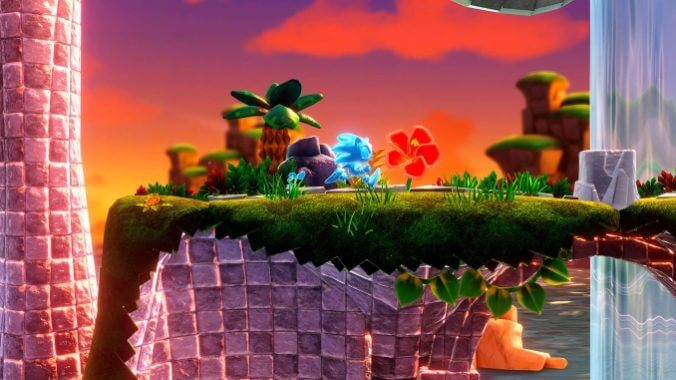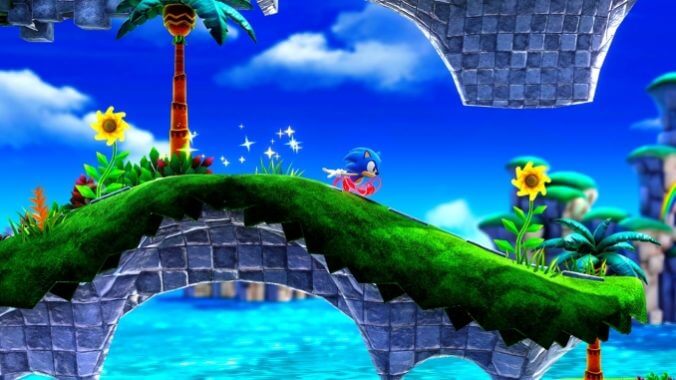Sonic Superstars is out and so it’s time to do my usual dance with the famous blue blur. I’ve sunk a not insignificant amount of time in the game, speeding through multiple of its stages in the last few days and trying to explore every nook and cranny of its labyrinthine design for goodies like bonus stages and power-ups. I’ve even had some fun doing this, but more than ever, I’m confused about the same thing that always confounds me when I pick up one of these titles: how am I meant to play Sonic games?
The iconic blue hedgehog’s catchphrase “Gotta go fast” suggests an obvious philosophy, but I’d contend that it is not in fact so obvious. Time and time again, I’ve picked up one of these games, revved up in ball form and gone fast, only to slam headfirst a few seconds later into some spike trap or deviously placed enemy. I’m more familiar with the sound of all my character’s rings leaving my body than I am the triumphant fanfare of completing a Sonic stage. The series’ premise then seems like little but a lie parroted by generations who’ve reinforced the wrong idea about a franchise for decades. And because of it, I always walk away from Sonic games with a sense of frustration, rather than joy. Even the triumphant Sonic Mania from some years ago couldn’t keep me, even when everyone around me swore up and down that it was “the good one.”
Sonic Superstars is no different. It’s enjoyed a relatively positive preview cycle, one that has let me enjoy the game not once or twice, but three separate times! Every time, I’ve come away from it hesitantly optimistic about the game too: I’ve enjoyed the new selection of powers at your disposal, co-op is maddeningly chaotic, and the bevy of bonus/mini games scattered throughout the levels I’ve played have injected a fresh bit of nostalgic fun into the game. This largely holds true in my time with the finished product, but simultaneously reveals some of what I’ve perceived to be weaknesses, or maybe “conflicts” is the better term, in the design of the game. For a game supposedly built around speed, there’s an awful lot to miss this time around. Players familiar with the series know to expect chaos emeralds hidden around the game to collect, but there are countless score-juicing bonus stages that dot every level and they are ridiculously easy to zoom past when you’ve built enough momentum for the background to become little but a blur. Building to that speed should feel exhilarating and rewarding given the series, but noticing these extra goals pass me by only fills me with a solemn contempt that I missed them for seemingly playing the game the “right way.”
In Sonic Superstars, this can become increasingly frustrating as you accidentally skip the new power-ups. Though I can’t tell you with absolute certainty that I have missed some, it certainly feels like I have considering how many stages I’ve completed and how little of my radial menu I’ve filled with new abilities! The ones I’ve collected don’t feel game-changing, leading me to believe that those I’ve missed are as likely to mix things up, but having outright blown past them feels like a sin of the game’s design, not my own. So then why am I punished with the absence of cool new skills?

After a while, I tried to find some reading on the matter, figuring I can’t be the only person in history to ever feel at odds with the Sonic franchise. Though I failed to turn up articles on the subject—even if I’m sure they’re out there—I did come across forum threads that echoed my feelings and even elucidated points about the design of these games that should feel clearer having played so many and yet eluded me. For example, and maybe I’m just a nonce who needs to read more, but I didn’t know levels had tiers designed with difficulty in mind and that bouncing between these tiers wasn’t necessarily the objectively best route. I knew that there were obvious layers to every stage, but you’d think the game might spell out at some point that they are intentionally laid out to cater to skill levels so as to avoid frustrating players like me who come to these games with little foundational knowledge about a franchise whose popularity has waned, or at the very least ebbed and flowed haphazardly. Little about the experience of playing a Sonic game teaches you to appreciate these aspects of it unless you just throw yourselves to the proverbial wolves, get chewed up, and are spit back out. It’s a classic approach that’s been refined by other games in other genres to cater to modern audiences, making the Sonic franchise daringly roguish for sticking by it this long, but also maybe a little too stubborn for its own good.
Elsewhere, I found that you’re not really supposed to always go fast, which really shook me to my core. Apparently—and I won’t say this is the definitive way to play, just what I’ve now seen passed off as sound advice—I’m supposed to take Sonic stages slowly at first, taking advantage of that tiered stage design and only occasionally going fast when the game really calls for it. Then when all is said and done, I’m supposed to feel encouraged to go back and relearn the routes I took, or take up new ones entirely, and develop a mastery of those, at which point I will be able to go fast because I’ve memorized patterns and timers in these levels. But that also doesn’t feel right because, and I mean no offense, but the Sonic franchise just is not that rewarding a platformer at that speed. Sonic speeds up much too fast and skids to a stop too sloppily, among other faults in his movement capabilities. He doesn’t have all that satisfying a jump, and lacks lethality against enemies. Sure, you can take in the intricacies of the meticulously laid out levels at this pace, but everything you’re free to do at this leisurely stroll is inferior to other platformers. Sonic’s identity as a character and franchise are tied to his speed, so telling me that you have to earn the right to be fast and fun feels counter to everything I’ve ever known about the games.
Walking away from this crisis, I think what I finally understand about Sonic is that there’s perhaps a definitive way to play these games that I don’t, and may never, get. I’m not even sure its fandom can agree on it, and that makes Sonic as interesting as it is baffling. Sonic Superstars is at the very least then, a worthy inheritor of that bewildering legacy. And so even if I’ll never be a Sonic lover, I can at least appreciate what an oddity it’s been and will likely continue to be, just maybe from afar from now on.
Moises Taveras is the assistant games editor for Paste Magazine. He was that one kid who was really excited about Google+ and is still sad about how that turned out.

